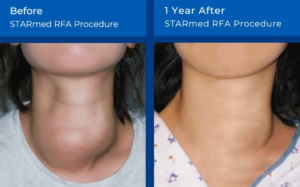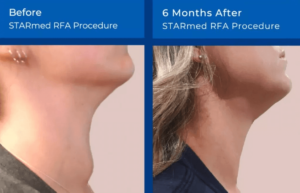Thyroid RFA
Radiofrequency ablation (RFA) is a safe and adequate technique for treating large thyroid nodules, overactive parathyroid nodules, and thyroid cancer in certain circumstance. Radiofrequency ablation (RFA) is not a new technology, rather it is one of the oldest and first applied to the treatment of tumors, eg liver cancers. RFA however is newly being applied to thyroid diseases, such as the treatment of a large thyroid nodule.
This treatment has significant impact on shrinking the nodule size and relieving symptoms. Interventional radiologists have used thermal ablation in cancers of kidney, liver and lung and these studies have not only shown decrease in size of the tumor but regression of the cancers.
Traditionally, only surgery or removal of the thyroid gland was the only option for symptomatic or cosmetic thyroid nodules. Surgery however has a higher rate of surgical complications, mortality rate, and morbidity of thyroid surgery, especially in older individuals. This can also leave behind an unflattering scar on the neck.1
Thyroid Nodules
Thyroid nodules are lumps that may appear in front of your throat. Nodules may be single or numerous, rigid or soft. Thyroid nodules are mostly benign, but you may have signs of thyrotoxicosis (excess thyroid hormone). Some nodules can act autonomously, thus producing excess thyroid hormone. A biopsy is recommended because it is necessary to exclude thyroid cancer. 3
Thyroid Nodules – Clinical Signs
Thyroid nodules can be benign or cancerous, a biopsy is required to determine what type of cells they contain. Sometimes repeat biopsies are required.
Most thyroid nodules are asymptomatic. However, some thyroid nodules can be active or “hot” and cause symptoms such as palpitation, heat intolerance, weight loss, etc due to excessive hormone production. Inactive nodules are generally asymptomatic until they grow large.
Here are some signs that large nodules can cause due to the size:
- Voice changes – pressure on the vocal nerves
- Shortness of breath or difficulty with breathing – pressure on the trachea
- Pain or discomfort when swallowing – pressure on the esaphagus
- Chronic cough – pressure on nerves or airways
- Foreign body sensation in the throat
- Cosmetic changes, bulging in the neck
Thyroid RFA Versus Surgery
Surgery has been the primary treatment offered for thyroid nodules until recently. The removal of the thyroid gland (partial or complete thyroidectomy) is an invasive treatment with numerous disadvantages, including lifelong hormone replacement, weight gain etc. RFA is a non-surgical treatment alternative that has been used for cancers in other organs for over 20 years and is now being offered for benign nodules of the thyroid.
Studies have proven recovery is faster and easier, and cosmetically appealing. RFA treatment can significantly reduce thyroid nodules volume and symptoms without the risks of surgery, surgical recovery, or surgical drains. RFA also has a higher likelihood of preserving the thyroid function without the need for hormone replacement. 5
Cost of surgery can be higher for thyroid removal than RFA as there are hospital, general anesthesia and potential hospital stay fees. RFA is well tolerating as an outpatient in-office procedure with a one day downtime.6
Thyroid RFA Results
Before the RFA procedure, our doctor will make your expectation clear by informing you of the realistic outcomes. This procedure does not shrink thyroid nodule instantly, it can take several months before there is noticeable difference. Similar to ablation in other organs, it takes some time for the body to resorb the ablated thyroid tissues.
Radiofrequency ablation (RFA) has shown significant result in restoration of thyroid function, normalization serum TSH (thyroid- stimulating hormone), and thyroid nodule volume reduction.8
Just like every other therapeutic procedures, RFA has a few risks and complications.


Thyroid RFA Risks
RFA has a lower risk of complications compared to surgical removal.
- Lower risks of damage to the surrounding tissues: trachea, lymphatic vessels, laryngeal nerve, blood vessels, and parathyroid glands.
- Lower risks of scaring, surgery has a visible large scar. RFA does not require any incision and leaves minimal to no visible scar.5
- Lower risk of voice change
- Low risk of skin burn, bleeding, recurrence, and nodule rupture.7
RFA is an accepted effective non-surgical treatment for benign thyroid nodules such as non-functioning nodules and AFTN (Autonomously Functioning Thyroid Nodules). You may consider RFA as possibly the first-line treatment for benign thyroid nodules.
Why Dr Allaei?
Dr Allaei is one of only a few RFA specialists specifically trained in ultrasound-guided procedures performing over 2,000 procedures yearly of different parts of the body. As a double-board certified imaging specialist, he has received 6 years of post-graduate training with specialization in ultrasound guided procedures and ablations, which requires a 3D spatial understanding while viewing a 2D image. In comparison, most other RFA specialist trained by taking a weekend course and only perform 20-100 ultrasound guided procedures yearly. Our specialist performs ablation of not only the thyroid but more complex organs such as cancers of the kidney, liver and lung. These more complex organs require a higher level of skill and understanding of the ablative technology to prevent damage to nerves, bowel and nearby organs.
REFERENCES
- Popoveniuc, G., & Jonklaas, J. (2012). Thyroid nodules. The Medical clinics of North America, 96(2), 329–349. https://doi.org/10.1016/j.mcna.2012.02.002
- Hegedüs, L. (2001). THYROID ULTRASOUND. Endocrinology and Metabolism Clinics of North America, 30(2), 339–360. doi:10.1016/S0889-8529(05)70190-0
- Spiezia, S., Garberoglio, R., Milone, F., Ramundo, V., Caiazzo, C., Assanti, A. P., … & Faggiano, A. (2009). Thyroid nodules and related symptoms are stably controlled two years after radiofrequency thermal ablation. Thyroid, 19(3), 219-225.
- Bernardi, S., Dobrinja, C., Fabris, B., Bazzocchi, G., Sabato, N., Ulcigrai, V., Giacca, M., Barro, E., De Manzini, N., & Stacul, F. (2014). Radiofrequency ablation compared to surgery for the treatment of benign thyroid nodules. International journal of endocrinology, 2014, 934595. https://doi.org/10.1155/2014/934595
- Che, Y., Jin, S., Shi, C., Wang, L., Zhang, X., Li, Y., & Baek, J. H. (2015). Treatment of Benign Thyroid Nodules: Comparison of Surgery with Radiofrequency Ablation. American journal of neuroradiology, 36(7), 1321–1325. https://doi.org/10.3174/ajnr.A4276
- Stan, M. N., Papaleontiou, M., Schmitz, J. J., & Castro, M. R. (2022). Nonsurgical Management of Thyroid Nodules: The Role of Ablative Therapies. The Journal of Clinical Endocrinology & Metabolism, 107(5), 1417-1430.
- Na, D. G., Lee, J. H., Jung, S. L., Kim, J. H., Sung, J. Y., Shin, J. H., Kim, E. K., Lee, J. H., Kim, D. W., Park, J. S., Kim, K. S., Baek, S. M., Lee, Y., Chong, S., Sim, J. S., Huh, J. Y., Bae, J. I., Kim, K. T., Han, S. Y., Bae, M. Y., … Korean Society of Radiology (2012). Radiofrequency ablation of benign thyroid nodules and recurrent thyroid cancers: consensus statement and recommendations. Korean journal of radiology, 13(2), 117–125. https://doi.org/10.3348/kjr.2012.13.2.117
- Vu, D. L., Pham, M. T., & Van Bang Nguyen, T. M. L. (2022). Efficacy and Safety of Radiofrequency Ablation for the Treatment of Autonomously Functioning Thyroid Nodules: A Long-Term Prospective Study. Therapeutics and Clinical Risk Management, 18, 11.




